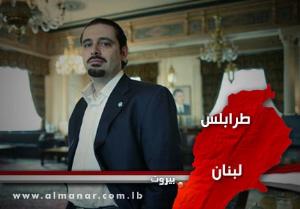 Lebanese MP Saad Hariri, the head of the country's Future Movement and leader of the March 14 coalition, is in Tripoli this weekend meeting with local officials and representatives in an effort to diffuse the ongoing violence between Sunni (Bab al-Tabaneh) and Alawite (Jabal Mohsen) neighborhoods of the city.
Lebanese MP Saad Hariri, the head of the country's Future Movement and leader of the March 14 coalition, is in Tripoli this weekend meeting with local officials and representatives in an effort to diffuse the ongoing violence between Sunni (Bab al-Tabaneh) and Alawite (Jabal Mohsen) neighborhoods of the city.
A special report published yesterday by Hezbollah's Al-Manar television casts a disingenuous light over Hariri's visit, stating that it resembles his previous election campaign maneuvers (i.e. 2005) to garner Sunni support from the country's north. It asserts that Hariri is actually on a mission to mobilize support against Syria, citing his claims of alleged Syrian involvement in the ongoing violence in Tripoli, as well as his view that the situation is intended to serve as a pretext for Syria's reentry into Lebanon.
The report doubts whether Hariri's reconciliation effort will indeed include meetings with leaders from the Alawite side, including representatives from Jabal Mohsen and the head of the largely Alawite Arab Democratic Party.
Meanwhile, the pro-March 14 Naharnet news highlighted Hariri's more recent talks with the party's leader Rifaat Eid today, in which it suggested that reconciliation may be close at hand.
Al-Manar's depiction of Hariri above (featured with the report) is one that speaks to the political value of the Tripoli situation, and is what initially caught my attention.
Here he is pictured in a palatial parlor room (perhaps at his residence in Koreitem) against the backdrop of chandeliers with his hands casually tucked in his pockets. The blood-red image of Lebanon, with Tripoli indicated in the north, contrasts sharply with the relatively soft palette of Hariri's portrait. In something more characteristic of a Canali advertisement, Hariri is presented as one more concerned with the finer things in life than the demands of the ‘people’, and as one far removed from the harsh reality of Tripoli's streets today.
Such a depiction is not surprising given Hariri's exceptional wealth, and his status as a prime political adversary of the Hezbollah-led opposition. Meanwhile, his efforts to reach out to the Alawite community of Tripoli this weekend, in which he vowed to help keep them safe from ‘external tampering’, is an indication of how the situation in Tripoli has perhaps acquired increased political importance.
Tripoli, a largely Sunni city, has also been a key support base for Hariri, and is thus an area from which Hezbollah undoubtedly seeks to gain increased support with the 2009 parliamentary elections approaching. In fact, Hezbollah last month signed a memorandum of understanding with Sunni Muslim salafist groups. This effort, however, ultimately fell apart.
While it's doubtful that Hariri's influence in the area will be undermined, the situation in Tripoli could be utilized against Hariri if he is perceived as being powerless in diffusing the situation or biased in favor of the Sunni population of the city. These developments lead one to ask if the sectarian violence in Tripoli is indeed symptomatic of Syria reasserting itself in Lebanon, or even perhaps the harbinger of a greater conflagration.